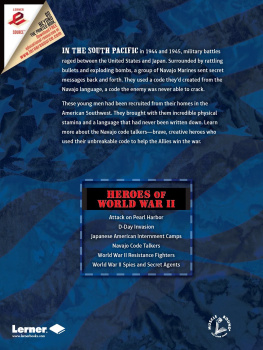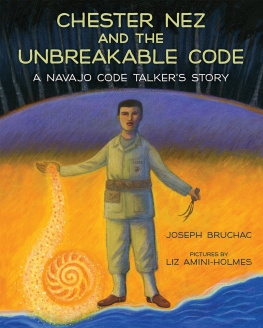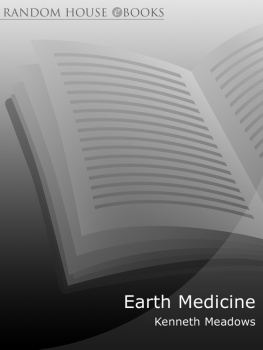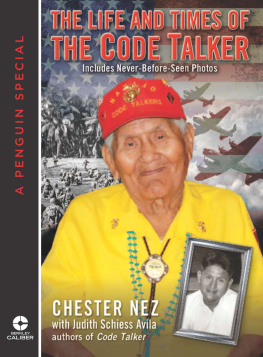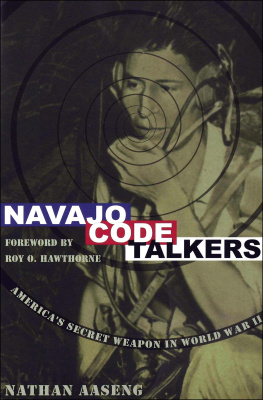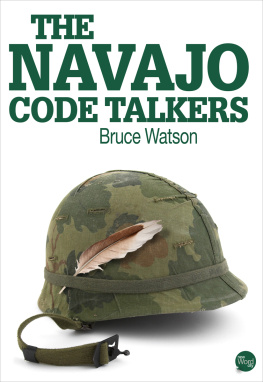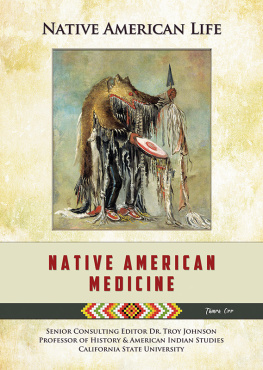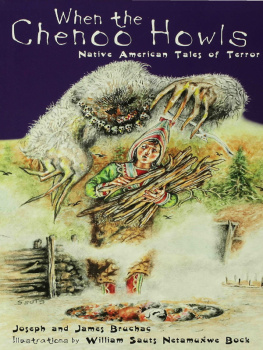THE FIRST CODE TALKERS
Native American Communicators in World War I
WILLIAM C. MEADOWS
University of Oklahoma Press
Norman

2800 Venture Drive
Norman, Oklahoma 73069
www.oupress.com
Publication of this book is made possible through the generosity of Missouri State University, Springfield.
Copyright 2021 by the University of Oklahoma Press, Norman, Publishing Division of the University. Manufactured in the U.S.A.
All rights reserved. No part of this publication may be reproduced, stored in a retrieval system, or transmitted, in any form or by any means, electronic, mechanical, photocopying, recording, or otherwiseexcept as permitted under Section 107 or 108 of the United States Copyright Actwithout the prior permission of the University of Oklahoma Press.
For information about permission to reproduce selections from this book, write to Permissions, University of Oklahoma Press, 2800 Venture Drive, Norman, Oklahoma 73069 or email .
ISBN 978-0-8061-6841-8 (hardcover)
ISBN 978-0-8061-6943-9 (ebook : mobipocket)
ISBN 978-0-8061-6964-4 (ebook : epub)
This eBook was converted from the original source file by a third-party vendor. Readers who notice any formatting, textual, or readability issues are encouraged to contact the publisher at .
For Saori K. and Keito V. Meadows
I am bringing a distant nation against you
An ancient and enduring nation,
A people whose language you do not know,
Whose speech you do not understand.
Jeremiah 5:15
CONTENTS
Appendices:
TABLES
ACKNOWLEDGMENTS
The research for this work involves Native American soldiers from several tribes and armed forces units and data encountered in small, scattered increments over nearly thirty years. This work allowed me to meet many individuals across the country. First I offer my sincere gratitude to individuals who provided interviews, documents, photographs, and contacts in their respective tribal communities:
Cherokee Nation of Oklahoma: Richard Allen
Choctaw: Chief Gregory Pyle; Chief Gary Batton; Judy Allen, historic projects officer and former editor of Bishinik, now Biskinik; Nuchi Nashoba, president, Choctaw Code Talkers Association; Regina Green, Choctaw Nation Museum; James Parrish and Teresa Billy, School of Choctaw Language, Choctaw Nation of Oklahoma; the Choctaw Code Talkers Association; Evangeline Wilson, Margaret Wilson McWilliams, Kathryn Hooker, Lila Douglas Swink, and Sarah Elizabeth Sawyer
Comanche: Albert Nahquaddy Jr., Lanny Asepermy, Robert Atchavit, Comanche Indian Veterans Association
Eastern Band of Cherokee: American Legion Post 143 (Stephen Youngdeer), Cherokee, NC
Osage: John Henry Mashunkashey
Hochunk: Ona Garvin
I extend my deepest appreciation to Judy Allen (Choctaw), who has shared documents with me since the mid-1990s, served as my host during research in Choctaw Country, was seminal in helping the Choctaw code talkers gain federal recognition, and who read and commented on a draft of this work; and to Nuchi Nashoba (Choctaw) for sharing information on the Choctaw code talkers, reading a draft of this work, and welcoming my participation in the Choctaw Code Talkers Association. Both have done so much to preserve knowledge of the Choctaw code talkers. I also extend my sincere gratitude to Sgt. Maj. Lanny Asepermy (Ret.) (Comanche), who for many years has been a valuable friend and consultant. Lanny shared many resources on Comanche veterans and long welcomed my interaction with the Comanche Indian Veterans Association, which in 2015 honored me for my work with Comanche code talkers at one of their monthly meetings; I am forever grateful for their kindness and friendship.
I also extend my thanks to Erin Fehr (Yupiq) of the Sequoyah National Research Institute in Little Rock, Arkansas, and to Sarah Elizabeth Sawyer (Choctaw). I came to know Erin after contacting the Sequoyah Institute in 2017 regarding their code talker exhibit and was later asked to write the text for a permanent website on WW I code talkers for the institute (Meadows 2018). Erin shared sources on code talkers as she encountered them. I met and began to network with Sarah during the research for her historically based novel on the Choctaw code talkers (Sawyer 2018), and we began sharing archival sources.
In September 2018, Erin located and visited with Mrs.


